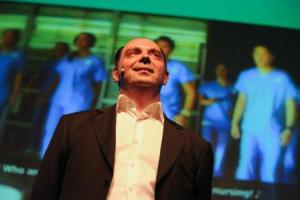Not better or worse. Just different.
 This is great summary of a keynote I gave this morning in Perth to LASA (Leading Age Services Australia) Congress on the Future of Aged Care.
This is great summary of a keynote I gave this morning in Perth to LASA (Leading Age Services Australia) Congress on the Future of Aged Care.
Written by Yasmin Noone of Australian Aging Agenda
Aged care organisations still equivocal about embracing new technology are basically committing business “suicide”, falling out of touch with the stakeholders they wish to engage and falling way behind their competitors.
This is the view of founder and head futurist at Futurevation, Morris Miselowski, who attempted to convince a 700-strong audience of the revolutionary power of present-day technology, at the Leading Age Services Australia (LASA) Congress in Perth this morning.
Mr Miselowski said that although individuals are free to choose to adopt or reject social media networks and technological developments, businesses that want to exist beyond 2012 are not.
“We are living through the equivalent of an industrial revolution,” Mr Miselowski said.
“We don’t know it yet as we are going through it step-by-step. But one day your grandkids will ask, ‘were you around when they developed the internet?’
“So step aside and look, not just at the ordinary and the mundane, but to the extraordinary,” said Mr Miselowski.
“Social media is not just a fad. It’s a fundamental change in the way we communicate.…The conversation about whether to be in it or not doesn’t exist any more. To not be ‘in it’ now is basically committing [business] suicide.”
Mr Miselowski drew on personal and professional experience to further demonstrate his argument that the world is on the path of massive technological change.
He said he has worked in 148 different industries in more than 30 years and in that time, “not one of those industries has stayed the same”.
“The future of aged care will drastically change, not because of machines but because of the way that people will interact with machines. It will have a positive impact on care, staff and stakeholders…
“This online reality is where the evolution and revolution is.
“The next 10 years are going to be significantly different to now. It won’t be better or worse, just different.”
Historical perspective
Urging the audience to consider what life was like 10, 60 and 200 years ago, Mr Miselowski also demonstrated how technological innovations have previously evolved society.
Methods of communication have developed over time since time actually began: from drawings on cave walls, to the invention of the first-ever newspaper, to Morse code, the radiogram and the black and white television set.
Social media and technological innovations are now pushing the world forward with what are simply “new methods of communication”. And so, this social and industrial change the world currently finds itself caught within, is not really anything different to what has happened in the past.
Mr Miselowski showed a series of videos to demonstrate technological innovations over the years and how each generation had always thought that its social change experiences were original.
Two clips resonated particularly strongly with the audience. One, dating back to 1947, was an advertisement of sorts for the nursing profession. The tone, colour and style of the advertisement was extremely ‘old fashioned’.
“We saw the nursing profession in that way, back then. But I doubt we would see it that way now…With the times, we have evolved.”
The older film was set in contrast to a more recent clip with nurses singing and dancing to a promotional hip hop/rap song.
“Who are we?” the nurse rappers sung. “We will be the future of nursing.”
Mr Miselowski commented on the two eras of nursing and how sometimes, history repeats itself in the way that it evolves: “They are not better or worse than the other. They are just different.”
“Your future has not yet been written. It only exists when you create it but hopefully this will give you some breadcrumbs along that journey.”
Facing realities
Mr Miselowski stressed that the reality today is technologically advanced: it is social media. It is mobile phones. It is a series of nursing care apps, which form part of the everyday work practices of community care staff. It is telehealth, telecare and mobile technology. And it is Facebook, Pinterest, Twitter, Instagram and a heap of other social media communication channels.
He said the future is aged care facilities built with virtual environments that change according to how a person wants them to change: a virtual lobby wall might turn into a virtual meeting room wall, and what seems like a pot plant on the side of the table could turn into a virtual bookshelf.
“There’s 23 million people in Australia. And there’s 30 million connected SIM cards.
“Around 60 per cent of the world’s population already has a mobile phone. In the next five years, it’ll increase to 80 per cent.
“Mobile phone [adoption] will allow developed countries to play catch up with us…So don’t take it for granted.
“Devices will drive, audit, inform and allow us to have conversations and do the care that we need to do. In our profession it will be a ‘game changer’.
“Again, it’s not better or worse. It’s just different,” said Mr Miselowski..
“When we decided to go to the moon in the 60s, there was no idea [at that stage about how specifically] to make it happen…
“The future is yet to be made.”